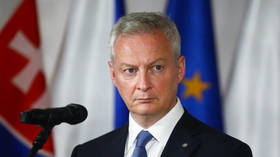BOMBSHELL – WORLD FIGHTS BACK AGAINST ‘EVIL’ U.S. – SHOCK COORDINATED CUT IN OIL OUTPUT BY OPEC+ THE DEATH BLOW, WITH MORE NATIONS SET TO FOLLOW – IT’S A ‘BOMB’ TO U.S. HEGEMONY & THE OIL PRICES THAT WASHINGTON IS DESPERATELY TRYING TO CONTROL WITH US$60 CAP TO ‘KILL’ RUSSIA – YET ‘UNFAITHFUL’ JAPAN THE FIRST G7 NATION TO JUMP SHIP DESPITE RECENT PHOTO-OP TRIP TO SHOW SUPPORT FOR UKRAINE AGAINST RUSSIA – AND EUROPEAN POLITICIANS, WHICH INCLUDE THE NOISEST ONES IN FRANCE, START TO TREMBLE AT THE HAVOC THEY HAVE CREATED FOR THEIR OWN COUNTRYMEN – BY CHOOSING TO BOOTLICK THE U.S. FOR ‘REASONS’ OF THEIR OWN
Output cut by OPEC+ constitutes ‘gut punch’ to US hegemony, showing its irresponsible policies would ‘shoot on its own foot:’ observers
The global oil price spiked on Monday as investors jotted over a surprising production cut announced by Saudi Arabia and other members of the Organization of the Petroleum Exporting Countries (OPEC) and its non-OPEC allies, including Russia, that translates to over 1 million barrels per day (bdp).
The coordinated decision follows months-long oil price dives on fear of a bleak global economic outlook that shrank crude demand, and such worries peaked in March after the collapse of US Silicon Valley Bank – the series of incidents are all the dire consequence of US’ destructive monetary policy.
Observers said the move by OPEC+ constitutes a “gut punch” to US hegemony amid the profound changes undertaking in the global geopolitical landscape, in particular in Asia. It also amounts to a reasonable defense of the victim countries of US hegemonic practices, ranging from abusing the dollar hegemony to monopolize bulk commodity market including petroleum, to instigating Russia-Ukraine conflicts for the purpose of making way for its own energy products in the European market.
The production cut should serve as a stern warning to Washington that irresponsible policies will only end up “shooting on its own foot,” analysts said, while flagging that abrupt oil price climb-up could not only drain the US’ strategic oil reserves, exacerbate runaway inflation, prompt foreign capital fleet but also mire the Federal Reserve in a policy dead end.
Saudi Arabia announced on Sunday that it will implement a “voluntary cut” of 500,000 bdp. Russia, a member of OPEC+, said it would extend its existing 500,000 bdp production cut until the end of the year.
Other OPEC+ members such as the United Arab Emirates, Kuwait, Algeria, Kazakhstan and Oman are also making cuts.
A Saudi energy ministry official said the move was “a precautionary measure aimed at supporting the stability of the oil market,” the Saudi Press Agency said. The voluntary cuts from OPEC+ members will begin in May and last until the end of 2023.
“This is a bomb to the market,” an industry insider specialized in bulk commodity trade told the Global Times on condition of anonymity on Monday. First of all, the scale of output slash is beyond market expectation. Second, the Saudi-led organization is joining hands with Russia to carry out the policy, suggesting a strong cooperation within OPEC+ mechanism despite US pressure, industry insiders said.
Market anticipated previously that OPEC+ members would enforce the same production policy without any fresh cuts.
On Monday, Brent crude futures and US West Texas Intermediate crude futures (WTI) surged as much as 8 percent, once topping over $80 a barrel.
A ‘punch’ to US hegemony
Responding to the latest cuts, a spokesperson for the US National Security Council said that “we don’t think cuts are advisable at this moment given market uncertainty … And we’ve made that clear,” Reuters reported.
Tian Yun, an independent macroeconomic analyst, told the Global Times on Monday the move shows that despite US pressure, OPEC+ members, as represented by Saudi Arabia, have been fleshing out independent policies that reasonably defend their fundamental interests.
“Oil sales serve as the lifeline of economies of Saudi Arabia as well as other OPEC+ members. On the heels of a potentially snowballing financial crisis, a further drop in crude price would slice them off millions of dollars in revenue, hammering the economic development,” Tian said.
He added that the announced surprising cut by OPEC+ also underscored that the capacities of Washington to manipulate other countries’ important policy-making are “going downhill,” despite its trumpeted geopolitical tools in hands. “In the longer term, the impact will be far-reaching and could be the beginning of dismantling the US hegemony,” Tian said.
In October, OPEC+ announced an output cut of 2 million bdp from November, declining a request by the Biden administration days before to delay its decision on oil output, CNBC reported.
In the oil field, US hegemony, which is fraught of plunder, has sparked widespread denouncements. The squeezing of Russian oil out of European supply market to make way for its own crude and LNG is one example, Li Haidong, a professor at the Institute of International Relations at the China Foreign Affairs University, told the Global Times on Monday.
“Blackmail, stirring up crises and conflicts, wars, and hijacking international institutions such as OPEC, it aims to keep the global crude market at its own use and as a tool for waging geopolitical struggle, rather than as a global public goods,” Li said.
Last year, the G7, Australia and the EU jointly implemented a $60 per barrel price cap on Russian seaborne crude oil.
The anonymous industry insider said oil price surge could be a boon for Russia, a major energy exporter. For China, the impact is limited since the country has stuck long-term trade deals with Russia and Saudi Arabia.
While there has been a built-up consensus among countries to break up the US hegemony, a geopolitical shift is also taking place in parallel, particularly evident in Asia.
Li noted that “Saudi Arabia is well aware of the US intention to use it as a pawn in geopolitical struggle with Russia and China. Seeing through the US role as a trouble maker in the region, Saudi has been adjusting toward a more balanced relation among its ties with major global powers.”
In March, Saudi Arabia and Iran finally reached an agreement, which includes resuming diplomatic relation, under the mediation of China.
‘Shooting on the foot’
The ripple effect of the output cut is also a vivid display of how US’ slews of shortsighted policies, which aim to transfer domestic issues to the rest of the world, have ironically backfired.
“Tracing the root cause, it was the US flood-like monetary policy two years ago that led to rampant global inflation. Then the Fed has been embarking on an aggressive rate hiking cycle to tame down the inflation since March 2022, which strained liquidity, triggered a tsunami of bank crisis and clouded international economic prospect. Oil price sank as a result of weaker global demand, which prompted OPEC+ to cut output to shore up the price,” Tian said.
The impact of the price hike is like “adding oil to the fire,” which will further send up US inflation and worsen the cost-of-living crisis, analysts said.
And that would leave Fed rate path in a dilemma: should it pause on tightening campaign and release more liquidity to ease the banking crisis which could potentially morph into a 2008-like financial crisis? Or should it continue the rate rise to tackle with an abrupt spike in inflation?
Either way, it’s a dead end, analysts said. Tian reckoned that incapacity of Biden administration in tackling domestic issues risks sparking political instability as the US enters presidential election period.
Under the US policy, the Biden administration shall dump Strategic Petroleum Reserve on the market when the price hit a certain level. But the White House said in October the level of stockpile was at its lowest since 1983, which analysts said also poses a risk of depletion if oil price continues hiking. GT
More countries may join oil production cut – Moscow
More oil-producing nations may slash their crude output, Russian Deputy Prime Minister Aleksandr Novak warned on Monday.
His comments follow the decision on Sunday by several members of the OPEC+ group to introduce voluntary additional cuts to their output starting from May until the end of 2023, in order to stabilize the oil market.
Some of the major producers, such as Russia, Saudi Arabia, Iraq and Kuwait, pledged a total of 1.66 million barrels per day (bpd) of cuts on top of the ones already introduced in November. The move sent oil prices roughly 6% higher on Monday, with US benchmark WTI Crude surpassing $80 a barrel.
“Since so far nine countries … have said that they would voluntarily cut [their oil output], and as you know, there are 23 members in OPEC+, there were discussions that other countries could also join and announce some additional cuts of their own, if they felt it was necessary in order to stabilize the market,” Novak said in an interview to the Rossiya 24 TV channel.
Novak’s comments were echoed by a report from Chief OPEC Correspondent Amena Bakr, who said on Twitter that more OPEC+ states were being encouraged to join the voluntary cuts.
The latest reductions come on top of the 2 million bpd cut introduced last year that’s set to run until the end of 2023. Russia also announced on Sunday that it would synchronize with OPEC+ and extend its own 500,000 bpd cut to the end of this year.
According to Novak, the measure is necessary to ensure predictability in the oil market in a period of high volatility due to the ongoing banking crisis in the US and Europe, general global economic uncertainty, and unpredictable and short-sighted energy policy decisions. RT
G7 member buying Russian oil above Western price cap – WSJ
One of the Group of Seven (G7) nations, Japan, has started buying Russian crude oil above the $60-a-barrel agreed cap after securing a US-authorized exception, the Wall Street Journal reported on Sunday.
According to the news outlet, Tokyo, which relies heavily on energy imports, reportedly got the concession from Washington, saying it needed it to ensure access to Russian fuel. Official statistics show that, in the first two months of this year, Japan bought around 748,000 barrels of Russian oil for approximately $70 a barrel.
Tokyo joined the price cap on Russian oil imports late last year, as part of a coordinated effort to lower Moscow’s oil revenues pitched by Japan’s long-time ally, the United States, and supported by the G7, the EU, and Australia. However, Tokyo exempted oil imports from the Sakhalin-2 project from the cap, stating that such a move would endanger the country’s energy security.
An official at Japan’s Ministry of Economy, Trade and Industry told the Journal that Tokyo wanted to ensure access to Sakhalin-2’s main product, natural gas, which is liquefied and shipped to Japan. “We have done this with an eye toward having a stable supply of energy for Japan,” the official reportedly said.
He explained that a small quantity of crude oil is extracted alongside the natural gas at Sakhalin-2 and needs to be sold to ensure liquefied natural gas (LNG) production continues. “The price is decided by negotiations between the two parties,” the unnamed official told the Journal.
The report pointed out that Russia accounts for nearly 10% of Japan’s natural-gas imports, most of it from Sakhalin-2, with volumes of purchases by Japan rising 4.6% last year in comparison to 2021.
The Journal also cited Japanese officials as saying it would be self-defeating to give up access to Russian LNG because Moscow could sell it to China.
Japanese Prime Minister Fumio Kishida announced late last month that the country’s companies would continue to participate in Russian energy projects on Sakhalin Island due to their importance for Tokyo’s energy security. RT
French minister ‘slapped in face’ over Russia sanctions – party leader

The new OPEC+ deal to reduce oil production levels is a fresh blow for French Economy and Finance Minister Bruno Le Maire, according to Florian Philippot, leader of the right-wing Les Patriotes (The Patriots) party.
“Bruno Le Maire, who was supposed to make the Russian economy ‘collapse,’ received another slap in the face,” Philippot wrote on Twitter.
The politician was reacting to the deal unveiled by the group of major oil producers, including Russia, Saudi Arabia, Iraq, Kuwait, and the UAE, to cut jointly production by up to 1.15 million barrels a day from May until the end of 2023.
Suhail bin Mohammed Al Mazrouei, the UAE’s energy minister, said that the move announced on Sunday was “a precautionary measure taken to ensure market balance.”
The upcoming change in production rate has led to a spike in prices, with West Texas Intermediate rising by as much as 8%, according to Gulf News. The surge comes as the US and EU continue to grapple with an energy crisis.
Western countries have attempted to curb Russia’s revenues from the oil trade as part of sanctions imposed in response to Moscow’s military operation in Ukraine.
Le Maire said in March 2022 that the goal of the EU’s “total economic and financial war” was to “cause the collapse of the Russian economy.” He later claimed that his remarks were “inappropriate” because they did not match the bloc’s “de-escalation” policy.
In January, Russian Deputy Prime Minister Aleksandr Novak said that despite the sanctions, the country’s revenues from oil and gas exports saw a nearly 30% increase in 2022. RT
GLOBAL TIMES / RT
.

